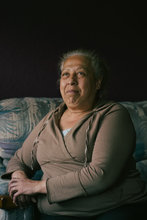0
Communications
Community:
Apr 3, 2023
ASTHO comes to our health agencies and partners saddened by our country's recent mass shooting. We mourn the losses of life from firearm violence as our families, schools, and communities continue to be impacted. ASTHO supports you now more than ever. The epidemic of firearm-related injury and death in the United States has become a critical public health and safety concern that affects everyone.
Authored by: Caitlin Langhorne & Tanya Baker for ASTHO
Topics: Community development, Criminal justice, Health, Mental health, Research
 Shared by Sandra Ware
Shared by Sandra Ware
Sandra Ware posted a
on May 25, 2023
Caitlin Langhorne & Tanya Baker for ASTHO
ASTHO comes to our health agencies and partners saddened by our country's recent mass shooting. We mourn the losses of life from firearm violence as our families, schools, and communities continue to be impacted. ASTHO supports you now more than ever.
0
Case study
Community:
Oct 25, 2022
Unsheltered homelessness is on the rise amid a systemic and widespread lack of affordable housing, supportive services, and livable wages. As the housing crisis worsens, homelessness has become increasingly visible and, as a result, increasingly dominant as a public concern.
Instead of addressing the issue’s root causes—a lack of housing and supportive services—many cities have leaned into punitive responses that criminalize homelessness, such as arresting people for sitting or sleeping in certain public places. But this approach is costly and ineffective. Police don’t solve homelessness, they only move it around—to other neighborhoods, jails, and emergency rooms—rather than connecting people with the housing and services they need.
What would it take to actually end homelessness for people living on the street? And how would that affect the time and resources police spend managing the problem without solving it? New data from a supportive housing program in Denver show what could happen when communities address the underlying causes of homelessness rather than continuing the status quo.
Authored by: Emily Peiffer for the Urban Institute's Housing Matters initiative
Topics: Criminal justice, Homelessness, Supportive housing
 Shared by Sandra Ware
Shared by Sandra Ware
Sandra Ware posted a
on Nov 1, 2022
Emily Peiffer for the Urban Institute's Housing Matters initiative
Unsheltered homelessness is on the rise amid a systemic and widespread lack of affordable housing, supportive services, and livable wages.
0
News Article
Community: Youth
Jun 29, 2017
One Summer Chicago Plus is a jobs program designed to reduce violence and prepare youth living in some of the city’s highest-violence neighborhoods for the labor market. This study was carried out over the summer of 2013 in partnership with the Chicago Department of Family and Support Services. It found that the program, which provided a six-week, minimum-wage job for 25 hours a week, reduced the number of violent-crime arrests for participants by 33 percent over the subsequent year. The One Summer Chicago Plus 2013 study—accompanied by a long-term follow-up of the 2012 program—closely examines the two to three years following the six-week program and finds that the reduction in violent-crime arrests is not driven simply by keeping participants off the streets during the summer. In fact, the decline in violence remains significant when the summer is ignored entirely.
Researchers did find, however, that the program had no significant impacts on schooling outcomes or engagement, nor did it have a positive impact on formal labor sector employment for all of the participants after the fact. The authors do note that it is possible that significant labor market effects will develop past the three-year window examined in the study.
Authored by: UNIVERSITY OF CHICAGO URBAN LABS
Topics: Child welfare, Community development, Criminal justice, Out-of-school time, Partnerships, Preventative care, Safety, Youth
 Shared by Housing Is
Shared by Housing Is
Housing Is posted a
on Oct 15, 2020
UNIVERSITY OF CHICAGO URBAN LABS
One Summer Chicago Plus is a jobs program designed to reduce violence and prepare youth living in some of the city’s highest-violence neighborhoods for the labor market. This study was carried out over the summer of 2013 in partnership with the Chicago Department of Family and Support Services.
0
News Article
Community:
May 6, 2019
Policymakers, academics and criminal-justice reformers all agree that access to education is both a front-end and back-end tool that decreases crime, increases social and economic mobility and supports informed, engaged citizenship. Not only is high-quality education effective, it is a lot less expensive than the cost of mass incarceration.
Authored by: Vivian Nixon for The Hill
Topics: Criminal justice, Education, Legislation & Policy
 Shared by Housing Is
Shared by Housing Is
Housing Is posted a
on May 30, 2019
Vivian Nixon for The Hill
Policymakers, academics and criminal-justice reformers all agree that access to education is both a front-end and back-end tool that decreases crime, increases social and economic mobility and supports informed, engaged citizenship.
0
News Article
Community:
Apr 21, 2019
The county’s preliminary results look promising: more than 78% of Vital clients were booked into jail less often once enrolled in the program for at least six months. On average, Vital participants went to jail about a third less often per year compared to the three years before their enrollment. A typical client had at least two fewer bookings into a King County Jail compared to the three years before entering the program.
Authored by: Vianna Davila for The Seattle Times
Topics: Criminal justice, Health, Homelessness, Housing, Mental health, Partnerships, Substance abuse
 Shared by Housing Is
Shared by Housing Is
Housing Is posted a
on Apr 25, 2019
Vianna Davila for The Seattle Times
The county’s preliminary results look promising: more than 78% of Vital clients were booked into jail less often once enrolled in the program for at least six months. On average, Vital participants went to jail about a third less often per year compared to the three years before their enrollment.
0
News Article
Community:
Apr 5, 2019
An Idaho lawsuit concerning how cities across the West enforce laws about sleeping in public—potentially changing how they treat their homeless populations—is now established as precedent. Barring a decision by the Supreme Court to address the case of Martin v. City of Boise, cities will not be able to arrest or punish people for sleeping on public property unless they provide adequate and relatively accessible indoor accommodations.
Authored by: Patrick Sisson for Curbed
Topics: Criminal justice, Homelessness, Housing, Legislation & Policy, Low-income
 Shared by Mica O'Brien
Shared by Mica O'Brien
Mica O'Brien posted a
on Apr 11, 2019
Patrick Sisson for Curbed
An Idaho lawsuit concerning how cities across the West enforce laws about sleeping in public—potentially changing how they treat their homeless populations—is now established as precedent. Barring a decision by the Supreme Court to address the case of Martin v.
0
Interactive
Community:
The Legal Bibliography is collection of 100+ papers, toolkits and other materials focused on privacy, consent and policy documentation. Co-developed by the Network for Public Health Law and Data Across Sectors for Health (DASH), the Bibliography is a growing resource for lawyers and community data practitioners, intended to support local collaboratives in their efforts to share data across sectors.
Authored by: Data Across Sectors for Health (DASH) and Network for Public Health Law (NPHL)
Topics: Criminal justice, Data sharing, Education, Health, Homelessness, Housing, Mental health, Partnerships, Safety
 Shared by Housing Is
Shared by Housing Is
Housing Is posted a
on Apr 8, 2019
Data Across Sectors for Health (DASH) and Network for Public Health Law (NPHL)
The Legal Bibliography is collection of 100+ papers, toolkits and other materials focused on privacy, consent and policy documentation.
0
Publication
Community:
Mar 1, 2019
CSH selected the Center for Data Science and Public Policy (DSaPP) at the University of Chicago to develop a web-based data integration tool, which was completed in 2018. The tool connects county jail administrative data from the justice system to homeless system data, through communities’ Homeless Management Information Systems (HMIS).
Authored by: CSH
Topics: Criminal justice, Data sharing, Homelessness, Housing, Midwest, Partnerships, Supportive housing
 Shared by Housing Is
Shared by Housing Is
Housing Is posted a
on Apr 4, 2019
CSH selected the Center for Data Science and Public Policy (DSaPP) at the University of Chicago to develop a web-based data integration tool, which was completed in 2018.
0
News Article
Community:
Mar 25, 2019
Many former offenders are denied housing — not because of the lack of funds or the failure to meet objective criteria, but because of their criminal history. Case in point: Matthew Charles, one of the first prisoners released under the First Step Act and one of President Trump’s guests at the State of Union address in February, has had difficulty securing an apartment, even with help from Kim Kardashian West.
Authored by: Karen Freeman-Wilson for The Washington Post
Topics: Criminal justice, Homelessness, Housing
 Shared by Mica O'Brien
Shared by Mica O'Brien
Mica O'Brien posted a
on Mar 26, 2019
Karen Freeman-Wilson for The Washington Post
Many former offenders are denied housing — not because of the lack of funds or the failure to meet objective criteria, but because of their criminal history.
0
Research
Community:
Mar 20, 2019
Launched in 2016, the Denver Supportive Housing SIB aims to support residents struggling with homelessness, substance use, and mental health problems by increasing the number of people getting and staying housed and reducing the number of days they spend in jail. The permanent supportive housing model combines a permanent housing subsidy with wraparound services, such as mental health counseling, to help people improve their stability. In Denver, MHCD and the Colorado Coalition for the Homeless (CCH) were selected to offer these services as part of the SIB.
Authored by: The Urban Institute
Topics: Cost effectiveness, Criminal justice, Homelessness, Housing, Low-income, Pacific Northwest, Partnerships, Research, Substance abuse
 Shared by Mica O'Brien
Shared by Mica O'Brien
Mica O'Brien posted a
on Mar 26, 2019
Launched in 2016, the Denver Supportive Housing SIB aims to support residents struggling with homelessness, substance use, and mental health problems by increasing the number of people getting and staying housed and reducing the number of days they spend in jail.
0
News Article
Community:
Feb 5, 2019
We beef up law enforcement to attack crime, devote more funding to try and improve inadequate schools and tackle health disparities by getting more people to the doctor. But what if Baltimore could solve all of its persistent social problems by getting rid of poverty?
Authored by: Baltimore Sun Editorial Board for The Baltimore Sun
Topics: Asset building, Criminal justice, Funding, Health, Legislation & Policy, Low-income, Mental health
 Shared by Housing Is
Shared by Housing Is
Housing Is posted a
on Mar 11, 2019
Baltimore Sun Editorial Board for The Baltimore Sun
We beef up law enforcement to attack crime, devote more funding to try and improve inadequate schools and tackle health disparities by getting more people to the doctor. But what if Baltimore could solve all of its persistent social problems by getting rid of poverty?
0
Webinar
Community:
Feb 28, 2019
Join us for an examination of how cross-sector data sharing initiatives are being used to tackle tough public health problems. The webinar will provide an in-depth look at a cross-sector collaboration in Illinois between public health, law enforcement, emergency medical services, a fire department and a jail aimed at addressing the needs of high utilizers of behavioral health services.
Authored by: The Network for Public Health Law
Topics: Criminal justice, Data sharing, Health, Mental health, Midwest, Partnerships, Safety, Stability
 Shared by Housing Is
Shared by Housing Is
Housing Is posted a
on Mar 6, 2019
The Network for Public Health Law
Join us for an examination of how cross-sector data sharing initiatives are being used to tackle tough public health problems.
0
News Article
Community:
Feb 28, 2019
The city says it plans to move ahead with a costly, stopgap renovation of a New Orleans jail building to house dozens of inmates with mental health issues — but it also wants to keep its options open.
Authored by: Matt Sledge for the New Orleans Advocate
Topics: Criminal justice, Housing, Legislation & Policy, Low-income, Mental health, South, Supportive housing
 Shared by Housing Is
Shared by Housing Is
Housing Is posted a
on Feb 28, 2019
Matt Sledge for the New Orleans Advocate
The city says it plans to move ahead with a costly, stopgap renovation of a New Orleans jail building to house dozens of inmates with mental health issues — but it also wants to keep its options open.
0
Publication
Community:
Feb 27, 2019
Over the past two decades, criminal justice reform has focused on evidence-based interventions to prevent arrests and incarceration and to facilitate community reintegration. These initiatives represent a movement toward a less punitive, more holistic approach to public safety, targeting critical social factors that lead to and perpetuate criminal justice involvement. Because housing problems are often a key underlying factor for people’s involvement with the criminal justice system, there are ways housing interventions can help lessen criminal justice involvement. Decriminalizing homelessness, for example, can reduce rates of initial arrest and incarceration, especially for people with low-level, nonviolent offenses. A sufficient supply of affordable housing and supportive services could help people stabilize after their release from jail and reduce the likelihood of recidivism. Policymakers, advocates, and practitioners in housing and criminal justice systems can partner to promote and evaluate housing strategies that divert people from the criminal justice system.
Authored by: Kimberly Burrowes for How Housing Matters (Urban Institute)
Topics: Criminal justice, Homelessness, Housing, Legislation & Policy, Low-income, Research, Stability
 Shared by Mica O'Brien
Shared by Mica O'Brien
Mica O'Brien posted a
on Feb 28, 2019
Kimberly Burrowes for How Housing Matters (Urban Institute)
Over the past two decades, criminal justice reform has focused on evidence-based interventions to prevent arrests and incarceration and to facilitate community reintegration.
0
Podcast
Community:
This episode features Martin Love, CEO and Jessica Osborne-Stafsnes, Program Manager at the North Coast Health Improvement and Information Network (NCHIIN) – a non-profit health information exchange in Humboldt County, CA. NCHIIN focuses on exchanging information across multiple sectors – including social care, medical care, behavioral health, criminal justice, education and more – to support care coordination and improve health. As an awardee of DASH CIC-START, NCHIIN worked with partners to add new organizations, sectors, and data streams to ACT.md, their care coordination and alerts notification system. They provided insights about engaging partners to incorporate the system into their workflows to provide more holistic care for patients, especially those with complex health and social needs.
Authored by: All In: Data for Community Health
Topics: Criminal justice, Data sharing, Education, Health, Mental health, Partnerships, West Coast
 Shared by Mica O'Brien
Shared by Mica O'Brien
Mica O'Brien posted a
on Feb 20, 2019
All In: Data for Community Health
This episode features Martin Love, CEO and Jessica Osborne-Stafsnes, Program Manager at the North Coast Health Improvement and Information Network (NCHIIN) – a non-profit health information exchange in Humboldt County, CA.
0
Publication
Community:
Jan 17, 2019
The North Coast Health Improvement and Information Network (NCHIIN) was funded by DASH CIC-START to add new partners, sectors, mental health client summary data, and facility alerts to ACT.md, the care coordination and alerts notification system in Humboldt County, CA. As part of their CIC-START project, NCHIIN developed this document, which provides a methodology for onboarding new organizations, data streams, and sectors into the ACT.md platform.
Authored by: Data Across Sectors for Health (DASH)
Topics: Criminal justice, Data sharing, Health, Mental health, Partnerships, Substance abuse
 Shared by Mica O'Brien
Shared by Mica O'Brien
Mica O'Brien posted a
on Feb 20, 2019
Data Across Sectors for Health (DASH)
The North Coast Health Improvement and Information Network (NCHIIN) was funded by DASH CIC-START to add new partners, sectors, mental health client summary data, and facility alerts to ACT.md, the care coordination and alerts notification system in Humboldt County, CA.
0
Report
Community:
Sep 4, 2018
This series of papers provides an overview and framework for reaching out to stakeholders or potential partners from other sectors that may share your interest in collaborating and sharing data to improve community health. Knowing your audience will help your collaboration craft a successful and productive outreach strategy, strengthen your partnerships, and ensure ongoing sustainability by clearly defining and articulating the value of sharing data across sectors.
Authored by: Data Across Sectors for Health (DASH)
Topics: Criminal justice, Health, Homelessness, Housing, Medicaid / Medicare, Partnerships
 Shared by Mica O'Brien
Shared by Mica O'Brien
Mica O'Brien posted a
on Feb 20, 2019
Data Across Sectors for Health (DASH)
This series of papers provides an overview and framework for reaching out to stakeholders or potential partners from other sectors that may share your interest in collaborating and sharing data to improve community health.
0
Publication
Community:
Feb 6, 2019
Decent, stable, and affordable rental housing has the power to improve lives, yet background checks and other systemic barriers reduce housing access and stability for a large part of the population—people who have been arrested or who are reentering communities after incarceration. The number of people who can be shut out of rental housing by criminal background checks and related policies calls for a national and local conversation about evidence-based ways to balance public safety and cohesion goals while supporting people with justice system histories in finding stable housing. Achieving this balance could interrupt cycles of inequity.
Authored by: Veronica Gaitan and Maya Brennan for How Housing Matters, Urban Institute
Topics: Criminal justice, Homelessness, Housing
 Shared by Housing Is
Shared by Housing Is
Housing Is posted a
on Feb 7, 2019
Veronica Gaitan and Maya Brennan for How Housing Matters, Urban Institute
Decent, stable, and affordable rental housing has the power to improve lives, yet background checks and other systemic barriers reduce housing access and stability for a large part of the population—people who have been arrested or who are reentering communities after incarceration.
0
Publication
Community:
Individuals transitioning out of the criminal justice system need a good place to call home so that they can reconnect with society and rebuild their lives.
Authored by: Opportunity Starts at Home
Topics: Criminal justice, Homelessness, Housing, Partnerships, Research
 Shared by Mica O'Brien
Shared by Mica O'Brien
Mica O'Brien posted a
on Jan 18, 2019
Opportunity Starts at Home
Individuals transitioning out of the criminal justice system need a good place to call home so that they can reconnect with society and rebuild their lives.
0
Publication
Community:
Dec 14, 2018
Health and reentry are closely related, and chronic medical, mental health, and substance use problems make it harder for newly released people to seek employment, obtain housing, and avoid reincarceration. Compared with the general population, justice-involved people tend to be in poorer health and need access to physical and behavioral health services, as well as the know-how and motivation to get care.
Authored by: Rochisa Shukla and Kamala Mallik-Kane for Urban Institute
Topics: Affordable Care Act, Criminal justice, Health, Legislation & Policy, Low-income, Medicaid / Medicare, Research, Stability
 Shared by Mica O'Brien
Shared by Mica O'Brien
Mica O'Brien posted a
on Dec 14, 2018
Rochisa Shukla and Kamala Mallik-Kane for Urban Institute
Health and reentry are closely related, and chronic medical, mental health, and substance use problems make it harder for newly released people to seek employment, obtain housing, and avoid reincarceration.
0
Report
Community:
May 1, 2018
The Enhanced Transitional Jobs Demonstration (ETJD), funded by the Employment and Training Administration of the U.S. Department of Labor, tested seven transitional jobs programs that targeted people recently released from prison or low-income parents who had fallen behind in child support payments.
Authored by: MDRC, OPRE, and Employment and Training Demonstration
Topics: Asset building, Cost effectiveness, Criminal justice, Legislation & Policy, Low-income, Research, Stability, Workforce development, Youth
 Shared by Mica O'Brien
Shared by Mica O'Brien
Mica O'Brien posted a
on Nov 19, 2018
MDRC, OPRE, and Employment and Training Demonstration
The Enhanced Transitional Jobs Demonstration (ETJD), funded by the Employment and Training Administration of the U.S.
0
Case study
Community:
Sep 25, 2018
Practitioners working on community safety have increasingly incorporated creative placemaking techniques into their work. Creative placemaking refers to the ways in which arts and culture change how people use the places they share.
Authored by: Mark Treskon for Urban Institute
Topics: Community development, Criminal justice, Low-income, Out-of-school time, Partnerships, Place-based
 Shared by Mica O'Brien
Shared by Mica O'Brien
Mica O'Brien posted a
on Oct 10, 2018
Mark Treskon for Urban Institute
Practitioners working on community safety have increasingly incorporated creative placemaking techniques into their work. Creative placemaking refers to the ways in which arts and culture change how people use the places they share.
0
Publication
Community:
Jul 27, 2018
On January 1, 2014, in states that have chosen to expand Medicaid eligibility under the Affordable Care Act, nearly all chronically homeless people who lacked health insurance became eligible for Medicaid. This Primer offers state Medicaid officials and other interested parties strategies for using Medicaid to meet the needs of this very vulnerable population--some strategies that have succeeded in the past and some that are emerging under provisions of the Affordable Care Act.
Authored by:
Topics: Affordable Care Act, Criminal justice, Disabilities, Dual-eligibles, Funding, Health, Homelessness, Housing, Low-income, Medicaid / Medicare, Mental health, Partnerships, Stability, Substance abuse, Supportive housing
 Shared by Housing Is
Shared by Housing Is
Housing Is posted a
on Jul 27, 2018
On January 1, 2014, in states that have chosen to expand Medicaid eligibility under the Affordable Care Act, nearly all chronically homeless people who lacked health insurance became eligible for Medicaid.
0
Publication
Community:
Jul 23, 2018
Part of New York State’s Homelessness Action Plan includes an investment of new supportive housing resources and services over the next five years to address vulnerable populations experiencing homelessness. Therefore, the availability of and access to various support services such as employment and training opportunities, parenting, counseling, independent living skills training, primary healthcare, substance disorder treatment and mental health care, child care, and benefits advocacy are critical components of any project funded under this plan.
Authored by:
Topics: Cost effectiveness, Criminal justice, Disabilities, Domestic violence, Foster care, Funding, Homelessness, Housing, Medicaid / Medicare, Mental health, Substance abuse, Supportive housing, Youth
 Shared by Housing Is
Shared by Housing Is
Housing Is posted a
on Jul 23, 2018
Part of New York State’s Homelessness Action Plan includes an investment of new supportive housing resources and services over the next five years to address vulnerable populations experiencing homelessness.
0
Publication
Community:
Jul 19, 2018
Assisting public housing residents on the path towards self-sufficiency requires going beyond providing decent, safe, and affordable housing. Public housing residents may face barriers to employment, such as limited education, job skills and/or proficiency in the English language. This toolkit is a resource for both frontline staff and management. It offers examples of how partnerships between DOL and HUD can increase public housing resident employment and create mutual benefit for both agencies.
Authored by:
Topics: Criminal justice, Disabilities, Funding, Housing, Legislation & Policy, Low-income, MTW, Partnerships, Workforce development
 Shared by Housing Is
Shared by Housing Is
Housing Is posted a
on Jul 19, 2018
Assisting public housing residents on the path towards self-sufficiency requires going beyond providing decent, safe, and affordable housing. Public housing residents may face barriers to employment, such as limited education, job skills and/or proficiency in the English language.


 Shared by Sandra Ware
on May 25, 2023
Shared by Sandra Ware
on May 25, 2023

 Shared by Sandra Ware
on Nov 1, 2022
Shared by Sandra Ware
on Nov 1, 2022
 Shared by Housing Is
on Oct 15, 2020
Shared by Housing Is
on Oct 15, 2020

 Shared by Housing Is
on May 30, 2019
Shared by Housing Is
on May 30, 2019


 Shared by Housing Is
on Apr 25, 2019
Shared by Housing Is
on Apr 25, 2019

 Shared by Housing Is
on Apr 8, 2019
Shared by Housing Is
on Apr 8, 2019
 Shared by Housing Is
on Apr 4, 2019
Shared by Housing Is
on Apr 4, 2019





 Shared by Housing Is
on Mar 11, 2019
Shared by Housing Is
on Mar 11, 2019


 Shared by Housing Is
on Mar 6, 2019
Shared by Housing Is
on Mar 6, 2019


 Shared by Housing Is
on Feb 28, 2019
Shared by Housing Is
on Feb 28, 2019

 Shared by Housing Is
on Feb 7, 2019
Shared by Housing Is
on Feb 7, 2019
 Shared by Housing Is
on Jul 27, 2018
Shared by Housing Is
on Jul 27, 2018
 Shared by Housing Is
on Jul 23, 2018
Shared by Housing Is
on Jul 23, 2018
 Shared by Housing Is
on Jul 19, 2018
Shared by Housing Is
on Jul 19, 2018